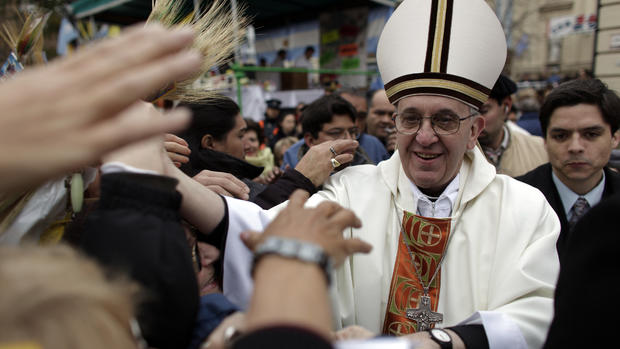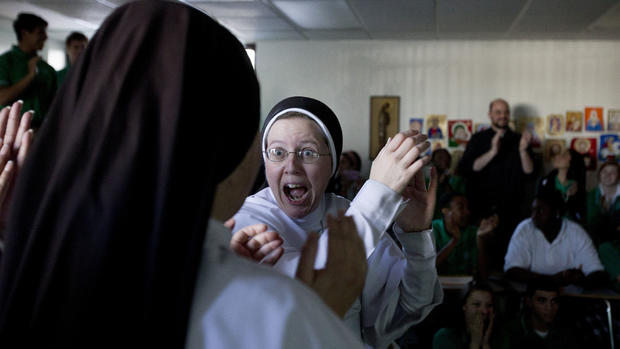A pope of firsts: Jesuit, Latin American and Francis
When Cardinal Jorge Mario Bergoglio, archbishop of Buenos Aires, emerged from the curtains of St. Peter's Basilica balcony Wednesday night, he was a novelty on several papal fronts - the first to pick the name Francis, the first Jesuit and, perhaps most notably, the first pope from outside Europe in more than a millennium.
"It seems as if my brother cardinals went to find him from the end of the earth, but here we are," Pope Francis declared as he was introduced as the new leader of the Catholic Church.
Indeed, as Francis bashfully saluted the rain-soaked throngs at St. Peter's Square, he was 7,000 miles from his home. Catholics across Latin America celebrated as the Argentine cardinal became the first pope from the hemisphere.
Father Frank Kennedy, director of the Jesuit Institute at Boston College, happened to be in Bogota when the white smoke emerged from the Sistine Chapel.
"The enthusiasm is palpable," Kennedy told CBSNews.com by phone. "It has given people here hope."
Nearly half of the world's Roman Catholics now live in the Americas or the Caribbean so the election made geographic sense for cardinals seeking to capitalize on the church's demographic shift. Ramon Luzarraga, an expert in the Catholic Church in Latin America whose family hails from Cuba, says the election of Francis proves "we have come into our own."
The election of Francis was not just a geographic turning point at the Vatican, but a shrewd nod to the church's roots, said Luzarraga, who teaches religion at Dayton University. A strong contingent of Spanish, Italian, and Germans call Argentina home and the South American country still maintains strong cultural ties to Europe.
"So it showed an acknowledgement that the future of the church is in the global south, including Latin America but ... they are saying in a tacit way, 'we are not leaving Europe,'" Luzarraga said.
- Jorge Bergoglio: Who is Pope Francis?
- American Catholics react to new pope
- Complete coverage: Change at the Vatican
Francis also becomes the first Jesuit pontiff - an almost unimaginable scenario considering Jesuits are expected to decline offers to take any ecclesiastical office. The Society of Jesus - a religious order founded in 1540 by Saint Ignatius - has become renowned for its academic rigor and aggressive missionary work. That explains why Jesuits are sometimes informally known as "God's marines."
Today, Jesuits are the largest order of religious men in the Roman Catholic Church. Kennedy said that Jesuits have historically been servants of the pope, vowing to "accept any mission that the Holy Father wishes to give us." That pledge has manifested itself in different ways through the centuries - from teaching and evangelizing in remote countries to serving the poor and neglected.
Pope Francis perhaps best personified this Jesuit axiom by showing compassion for victims of HIV-AIDS and drug abuse. According to media reports, then-Cardinal Jorge Mario Bergoglio visited a hospice to wash the feet of AIDS patients in 2001; he replicated the act while visiting recovering drug addicts at a Buenos Aires rehab center in 2008.
"(Jesuits) live in the heart of the church but also on the edges of the church to administer to those no one else will administer to," Kennedy said.
Rev. David J. Collins, who teaches at Georgetown University, says that Francis embodies the Jesuits' reputation for a highly pragmatic, "get-it-done" style.
"I think Francis's decision, as archbishop, not to live in the episcopal palace or to be chauffeured around are good examples of his bucking custom and convention to just make clear that the Church needs to be on the side of the poor and the marginalized," Collins said.
Indeed, the new pope is renowned for his unassuming nature and austerity - which perhaps explains why he is the first pontiff to ask to be called Francis. In Catholic tradition, St. Francis of Assisi lived in poverty and dedicated his life to rebuilding the church. The name may also be a nod to Francis Xavier, a co-founder of the Jesuit order.
In addition to mission work, Jesuits are primarily known for their intellectual prowess. Georgetown and Boston College are just two of 28 Jesuit colleges and universities in the U.S., and the order is known for building schools as part of their global missionary work.
Ultimately, it is Francis' Jesuit combination of intellectualism and humility that may serve him best as pontiff. In short, he can speak to the highly-educated and the common man.
"He embodies the Jesuits by being a bridge between the intellectual life of the church and he's able to reach and connect with the people with that strong pastoral sense," Luzarraga said. "That's a gift and a skill."

